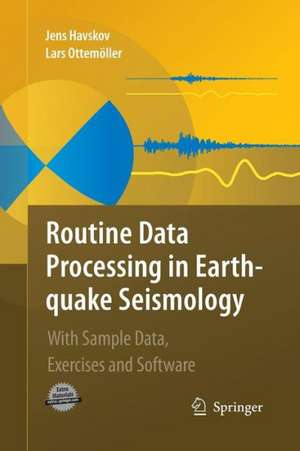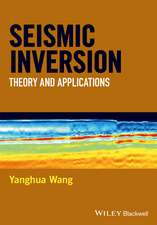Routine Data Processing in Earthquake Seismology: With Sample Data, Exercises and Software
Autor Jens Havskov, Lars Ottemolleren Limba Engleză Paperback – 14 noi 2014
This book is intended for everyone processing earthquake data, both in the observatory routine and in connection with research. Using the exercises, the book can also be used as a basis for university courses in earthquake processing.
Since the main emphasis is on processing, the theory will only be dealt with to the extent needed to understand the processing steps, however references will be given to where more extensive explanations can be found.
Includes:
• Exercises
• Test data
• Public domain software (SEISAN)
available from http://extras.springer.com
| Toate formatele și edițiile | Preț | Express |
|---|---|---|
| Paperback (1) | 833.20 lei 6-8 săpt. | |
| SPRINGER NETHERLANDS – 14 noi 2014 | 833.20 lei 6-8 săpt. | |
| Hardback (1) | 839.36 lei 6-8 săpt. | |
| SPRINGER NETHERLANDS – 25 mai 2010 | 839.36 lei 6-8 săpt. |
Preț: 833.20 lei
Preț vechi: 1016.10 lei
-18% Nou
Puncte Express: 1250
Preț estimativ în valută:
159.45€ • 165.52$ • 132.96£
159.45€ • 165.52$ • 132.96£
Carte tipărită la comandă
Livrare economică 25 martie-08 aprilie
Preluare comenzi: 021 569.72.76
Specificații
ISBN-13: 9789400790780
ISBN-10: 9400790783
Pagini: 360
Ilustrații: XI, 347 p.
Dimensiuni: 155 x 235 x 19 mm
Greutate: 0.5 kg
Ediția:2010
Editura: SPRINGER NETHERLANDS
Colecția Springer
Locul publicării:Dordrecht, Netherlands
ISBN-10: 9400790783
Pagini: 360
Ilustrații: XI, 347 p.
Dimensiuni: 155 x 235 x 19 mm
Greutate: 0.5 kg
Ediția:2010
Editura: SPRINGER NETHERLANDS
Colecția Springer
Locul publicării:Dordrecht, Netherlands
Public țintă
ResearchCuprins
Earth Structure and Seismic Phases.- Instruments and Waveform Data.- Signal Processing.- Location.- Magnitude.- Focal Mechanism and Seismogram Modeling.- Spectral Analysis.- Array Processing.- Operation.
Recenzii
From the reviews:
“A book useful for training students in basic analysis skills … . The book has a clear target audience: the routine analysts who manually process seismic network data. … The approach could be characterized as suitably utilitarian. A strength of the book is the assumption that operators will use one of the existing seismic data analysis systems. The authors have a fairly wide knowledge of present systems and data recording formats and present some useful critiques of them.” (George Helffrich, Geological Magazine, February, 2011)
“The book presents a very good overview of the routine data processing in earthquake seismology. It should find its place at every seismological data center, serving as a general guide, a reminder of the issues that are not part of the data center’s everyday routine and an overview for the data center’s beginners or for visitors.” (Pawel Wiejacz, Pure and Applied Geophysics, Vol. 168, 2011)
“A book useful for training students in basic analysis skills … . The book has a clear target audience: the routine analysts who manually process seismic network data. … The approach could be characterized as suitably utilitarian. A strength of the book is the assumption that operators will use one of the existing seismic data analysis systems. The authors have a fairly wide knowledge of present systems and data recording formats and present some useful critiques of them.” (George Helffrich, Geological Magazine, February, 2011)
“The book presents a very good overview of the routine data processing in earthquake seismology. It should find its place at every seismological data center, serving as a general guide, a reminder of the issues that are not part of the data center’s everyday routine and an overview for the data center’s beginners or for visitors.” (Pawel Wiejacz, Pure and Applied Geophysics, Vol. 168, 2011)
Textul de pe ultima copertă
The purpose of this book is to get a practical understanding of the most common processing techniques in earthquake seismology. The book deals with manual methods and computer assisted methods. Each topic will be introduced with the basic theory followed by practical examples and exercises. There are manual exercises entirely based on the printed material of the book, as well as computer exercises based on public domain software. Most exercises are computer based. The software used, as well as all test data are available from http://extras.springer.com.
This book is intended for everyone processing earthquake data, both in the observatory routine and in connection with research. Using the exercises, the book can also be used as a basis for university courses in earthquake processing.
Since the main emphasis is on processing, the theory will only be dealt with to the extent needed to understand the processing steps, however references will be given to where more extensive explanations can be found.
Includes:
• Exercises
• Test data
• Public domain software (SEISAN)
available from http://extras.springer.com
This book is intended for everyone processing earthquake data, both in the observatory routine and in connection with research. Using the exercises, the book can also be used as a basis for university courses in earthquake processing.
Since the main emphasis is on processing, the theory will only be dealt with to the extent needed to understand the processing steps, however references will be given to where more extensive explanations can be found.
Includes:
• Exercises
• Test data
• Public domain software (SEISAN)
available from http://extras.springer.com
Caracteristici
Only book of its kind Provides background, data examples, exercises and integrated software












